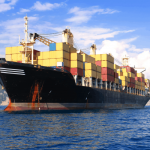Perhaps China Is Loosening Its Insane Covid Zero Policies… a Little
Several news stories in recent days report COVID cases discovered in China and worry about port shutdowns and more disruption rippling through global supply chains. There’s plenty of reason for this fear. All it takes is a single positive COVID test for China to shut down one of the busiest ocean freight terminals in the world. China has a more-than-a-little-problematic Covid Zero policy that we’ve talked about quite a bit in Universal Cargo’s blog. Here’s a handful of related posts:

China’s Covid Zero Policies Worsen Supply Chain Problems
Ocean & Air Shipping Delayed by China’s COVID Restrictions
Airliner Suspends Air Cargo Flights and Port of Los Angeles Threatens Big Fees Again
Updates on the Port of Ningbo Terminal Closure
Single COVID Case Shuts Down Major Chinese Port Terminal
Good News, Bad News: Yantian Port Back to Full; Freight Rates Rise Even Higher
COVID Endemic But Less Virulent with Omicron’s Rise
At this point, we know Covid-19 is endemic. There was once hope that with the vaccines, herd immunity could basically end the virus. However, it quickly became clear the vaccines didn’t provide the protection from getting and spreading the virus that was initially promised, no matter how many doses or boosters you get. Dr. Anthony Fauci – Director of NIAID and America’s most famous bureaucrat who told the public himself that if you criticize him or his policies, you criticize science itself – even admitted to lying to the public (and not for the first time during the pandemic) about the percentage of people vaccinated it would take to achieve herd immunity.
Here’s what he told the New York Times (which is not unlike how when he changed his position on masks without new evidence, he told the public he was initially lying to them for their own protection):
“When polls said only about half of all Americans would take a vaccine, I was saying herd immunity would take 70 to 75 percent,” Dr. Fauci said. “Then, when newer surveys said 60 percent or more would take it, I thought, ‘I can nudge this up a bit,’ so I went to 80, 85.”
“We need to have some humility here,” he added. “We really don’t know what the real number is. I think the real range is somewhere between 70 to 90 percent. But, I’m not going to say 90 percent.”
Now with the omicron variant, evidence points to the vaccine having little if any efficacy in preventing infection, further stapling COVID as endemic. Luckily, while omicron is much more contagious, outpacing previous variants and taking over as the most prevalent form of the virus, it is also much less virulent, meaning it’s not nearly as likely to land someone who contracts it in the hospital or, worse, kill him or her.
Janice Kew reported in Bloomberg:
South Africans contracting Covid-19 in the current fourth wave of infections are 80% less likely to be hospitalized if they catch the omicron variant, compared with other strains, according to a study released by the National Institute for Communicable Diseases.
Perhaps because all evidence and studies so far similarly show far less virulence when it comes to the omicron variant of COVID that there’s a ray of hope hidden in the gloom and doom stories of new cases found in China about to send new waves of supply chain disruption because of the country’s heavy-handed Covid Zero response.
The Hope of Loosening Covid Zero Policy in China
Here’s where the hope pops in. In a Fortune article about how Chinaa’s Covid Zero response to omicron could cause supply chain chaos, Grady McGregor and Eamon Barrett reported:
When ports in Shenzhen and Ningbo reported minor COVID outbreaks last year, authorities quickly closed shipping terminals, causing traffic jams of huge container ships and a backlog that eventually caused congestion elsewhere as ships rerouted to China’s other harbors.
But the outbreak in Tianjin has yet to prompt any port closures.
On Wednesday, when local authorities ordered workers in the city to take a day off to facilitate another round of testing, the Tianjin Port Authority announced it had tested 4,920 of its employees as of Sunday and that “all of the wharf companies are operating normally.”
China isn’t exactly known for its honesty when it comes to reporting, but the article goes on to say:
In an email to Fortune on Monday, shipping giant Maersk said the company had experienced zero disruption from the current outbreak in Tianjin.
I would say ordering a day off for testing is a little bit of a disruption, but there is some hope that China may be realizing a complete Covid Zero approach is not sustainable or beneficial, especially in light of omicron’s increased transmissibility and decreased virulence. That Tiajin Port hasn’t experienced major disruption is a sign that China may be loosening its Covid Zero policies a little bit. But only a little bit. Meanwhile, there has been disruption at another major Chinese port. Grady McGregor and Eamon Barrett went on in their reporting:
However, Maersk noted that a concurrent outbreak in Ningbo—a port just south of Shanghai—had snarled operations.
China’s Current Heavy-Handed Actions
China is still massively locking down its citizens while executing city-wide testings, which is both oppressive for its citizens and a problem for its manufacturers. Grady McGregor and Eamon Barrett give a taste of what’s happening there in their Fortune article:
In northern Xi’an, where residents have endured a bruising three-week lockdown that began in December, Samsung has suspended operations at its semiconductor factory since staff are unable to get to work. The group said it plans to “[leverage] our global manufacturing network, to ensure that our customers are not affected.”
In southern Zhengzhou, the home of major iPhone assembler Foxconn, the government discovered dozens of local cases this week after launching an effort to test all 12.6 million city residents last Friday. Foxconn told Chinese media this week that the cases in Zhengzhou have “not affected production capacity thus far,” even as authorities in Anyang, a city 100 miles from Foxconn’s campus, announced stay-at-home orders for all 5 million residents earlier this week.
Meanwhile in Tianjin, where authorities ordered residents into semi-lockdown so that health officials can test all 14 million residents, Japan’s Toyota and Germany’s Volkswagen have both suspended factory output.
Factories are fast approaching a time when they shut down anyway with the Chinese New Year festivities beginning on February 1st this year. Of course, celebrations will likely be curtailed as the government is not likely to let its citizens do much traveling to see family this year. But maybe, just maybe, in all of this madness, China is starting to recognize how problematic its Covid Zero policies are.




